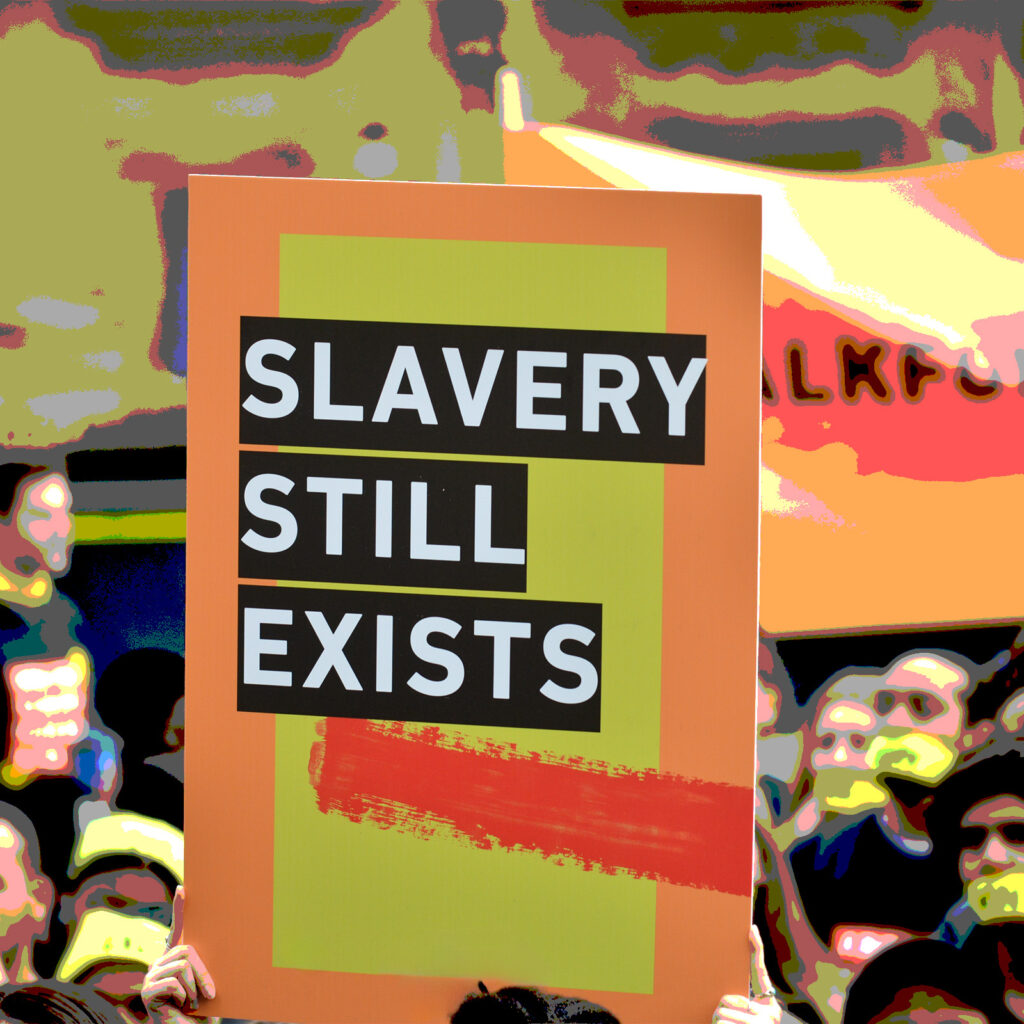AIMS
Exploring how data science and AI can address the issue of modern slavery.
Context
Project AIMS leverages modern AI techniques to help analyze corporate reporting data and promote compliance with modern slavery laws. Over time, this can lead to a viable global solution in the fight against modern slavery.
In 2020, Adriana Bora and The Future Society partnered with Walk Free to launch phase one of Project AIMS. Building on work already carried out by Walk Free, WikiRate, Business & Human Rights Resource Centre, the aim of the project was to create a methodology for analyzing statements produced by private companies under the UK Modern Slavery Act.
Today, approximately 50 million people live in circumstances involving slavery-based practices. One such practice is forced labor, a type of exploitation often embedded into corporate supply chains. Unfortunately, the complex world of supply chains is particularly opaque, which has enabled the widespread use of forced labor.
Human rights organizations use various indicators to assess the prevalence of this problem. According to the international human rights group Walk Free, G20 countries import USD$468 million worth of products annually – including electronics, garments, palm oil, solar panels, textiles and other everyday goods – considered to be at risk of being produced by forced labor.
The Modern Slavery Acts (MSA)
The United Kingdom and Australia were among the first countries to adopt laws on modern slavery. Many other countries have joined them or are considering similar legislation.
Modern slavery laws generally require large companies to publish annual reports outlining their efforts to eliminate slavery from their supply chains. This transparency helps governments and citizens hold the private sector accountable and advocate for change, both locally and globally.
The Challenge with Corporate Reporting
In the UK alone, an estimated 12,000 to 17,000 statements on modern slavery are published each year. Australia received around 3,500 statements in its first reporting cycles, and these numbers are expected to rise. Without adequate resources, governments and NGOs struggle to properly review this volume of information. As a result, many statements remain unanalyzed.
As more countries adopt modern slavery laws, the number of statements submitted annually is likely to increase. However, the lack of proper analysis can significantly weaken the impact of the law and hamper efforts to address modern slavery.
Project AIMS Phase Two
Project AIMS has engaged with two of the world’s most renowned AI and data science research organizations: Mila and QUT’s Centre for Data Science for the next phase of its research.
- The QUT Centre for Data Science plays a pivotal role in this phase, not only by awarding Adriana Bora a PhD scholarship and assembling a team of experts for research support but also by fostering vital connections with relevant Australian organizations and stakeholders.
- Distinguished Professor Kerrie Mengersen, Director of CDS, and Professor Melissa Bull, Director of QUT Centre for Justice, are supervising the development of the PhD research.
Using the Australian Modern Slavery Act as a test case, the goal is to explore how cutting-edge AI can be used to compare thousands of private sector statements. Our objectives are to:
- Examine the feasibility of equipping governments, NGOs and industry with a robust solution capable of analyzing large volumes of company reported data.
- Gather insights that will help authorities and companies better understand where to focus resources to improve corporate MSA compliance.
- Equip citizens and investors with the knowledge they need to make informed decisions about the companies they engage with.
Project AIMS also hopes to inspire others to apply their expertise, whether in software engineering, data science or social sciences to the field of AI in the fight against modern slavery.
The Launch of Project AIMS & Phase One Research (2020-2021)
Project AIMS was initiated as part of a master's thesis by Adriana Bora, one of the 20 Rising Stars in AI Ethics and one of the Top 100 Romanians Living Abroad in the science category. A social scientist passionate about leveraging machine learning for social good, Adriana Bora began researching how AI could play a role in eliminating modern slavery. Adriana is now a PhD candidate in our Centre for Data Science.
Using data science, machine learning techniques like natural language processing (NLP) and computational linguistics, the first phase of Project AIMS looked for methods that would enable swift and comprehensive analysis of MSA reports. These methods could help users to obtain valuable information about slavery statements, which would be an essential step towards improving transparency within corporations and fostering continued progress in the global fight against this pressing challenge.
Phase One Outcomes
Learning
- Results made available open source on the Future Society’s GitHub.
- Learning and Recommendations published at the proceedings of the AAAI Fall 2020 Symposium on AI for Social Good.
Impact
- Awarded the UNESCO International Research Centre in Artificial Intelligence AI Award in 2021.
- Findings used in the Submission to the Review of Australia’s Modern Slavery Act 2018.
- AIMS as a case study for policy brief on Artificial Intelligence: Addressing or Distorting the Modern Slavery Challenge.
Get involved
Project AIMS is a unique opportunity for organizations and companies that believe in the power of social change. Join us and play a leading role in the fight against modern slavery in corporate supply chains.
By supporting Phase Two of Project AIMS, you will be aligned with other leading industry partners.
- Mila is already working on a wide range of research projects with Fortune 100 companies such as Microsoft, Meta, IBM, and more.
- QUT collaborates with a range of industrial, government and academic partners to explore important research challenges.
What do we need?
We are seeking to fund the planned 2-year Phase Two research project using Australia’s Modern Slavery Act as a test case. Partners can help us create valuable open source research and lay the groundwork for a long-term, data-driven solution for monitoring compliance and tackling modern slavery.
Why support us?
Partnering with Project AIMS goes beyond supporting research. It’s an opportunity to drive forward important change that can have a tangible impact.
- Work with other global partners and play a leading role in the fight against modern slavery.
- Expand philanthropic efforts in a meaningful and impactful way.
- Broaden existing corporate social responsibility objectives and meet consumer and investor expectations.
Project Team
News & Awards
- Platforms supporting Ukrainian refugees must prioritise their safety — or risk exposing them to trafficking and exploitation – Article in The Conversation, April 2022
- International Research Center on Artificial Intelligence (UNESCO) – AI Award 2021
- March 17, 2021, The Future Society – Project AIMS Article
Resources
- Notebooks developed under Project AIMS from April 2020 – June 2021
- VIDEO: GPAI – Montreal Summit: Panel Project AIMS – Project AIMS was selected as a promising use-case of responsible AI for Social Good at the Global Partnership on AI (GPAI) Montreal Summit 2020
- Walk Free’s Global Slavery Index – the world’s most comprehensive data set of modern slavery
- AAAI Conference Proceeding Publication
- VIDEO: UN World Data Forum 2021 – Measuring and combatting modern slavery with data-driven solutions in times of a pandemic
- VIDEO: UN World Data Forum 2020 – Giving Voice to Hidden Populations: Measuring & Combatting Modern Slavery With Data-Driven Solutions
- VIDEO: The Good AI Conversation – Panel: Can AI enable a more sustainable supply chain?





